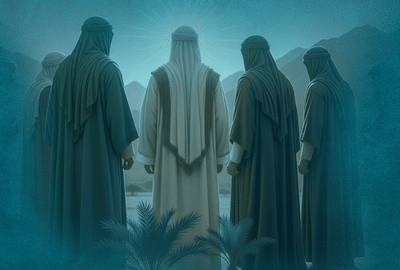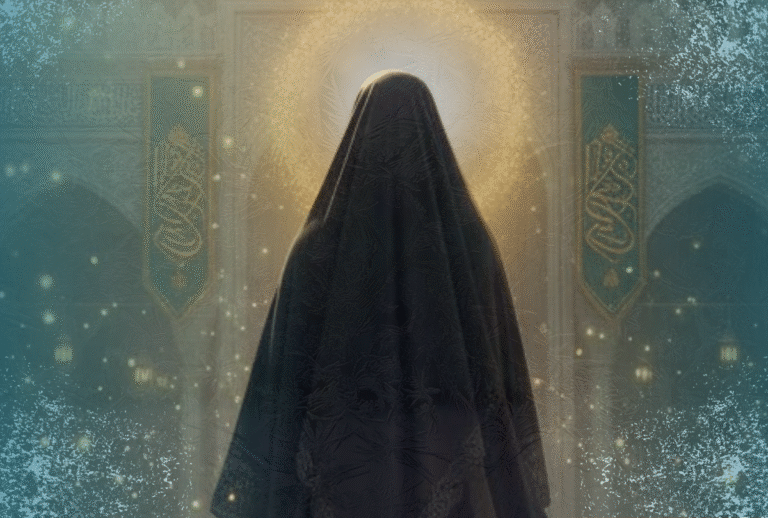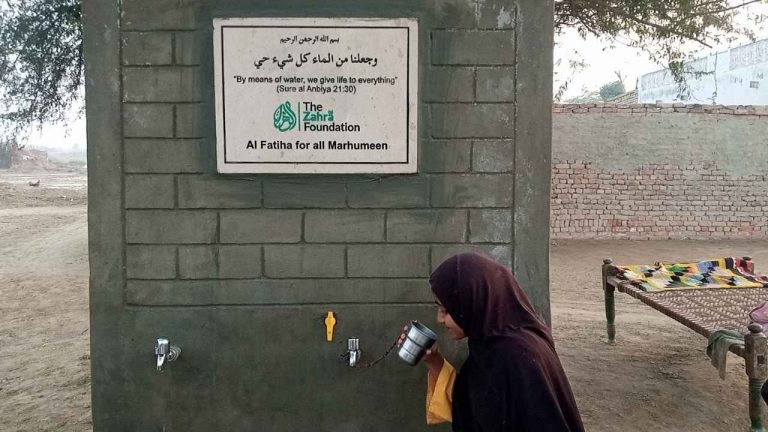What Timeless Lessons Can We Learn From the 12 Imams?
In the Shia Islamic tradition, the Twelve Imams (as) are more than historical figures: they are guides, intercessors, sources of knowledge, and exemplars of righteousness.
Here are 12 hadiths and narrations from the Imams (as) that illustrate their importance, status, and the obligations toward them.
May these strengthen our love, understanding, and closeness to the Ahlulbayt (as).
1. Imam Ali (as): The World Has Two Days
Imam Ali (as) is the first Imam, following the death of Prophet Muhammad (saww). After becoming the Prophet’s son-in-law through his marriage to Lady Fatima (sa), the daughter of Prophet Muhammad (saww), Imam Ali (as) went on to rightfully lead the Muslim community and raise his two sons, Imam Hassan (as) and Imam Hussain (as), both of whom would become the next chosen Imams.
One hadith remains powerfully remembered by Imam Ali (as), showcasing his depth of wisdom and faith:
“The world has two days; one for you and the other against you. When the day is for yours, do not feel proud, but when it is against you, you should endure it. Through both of the days, you are put to the test.” (Abu-kayyan Al-Tawhidi, Al-Basa’ir wa’l-Dhakha’ir, pp. 155.)
2. Imam Hassan (as): Giving Before Being Asked
Imam Hassan (as) is the second Imam and the son of Imam Ali (as). Known for his patience, steadfastness in faith, and intellect, Imam Hassan (as) led the Muslim community through tumultuous times against himself and the family of the Prophet (saww) until his martyrdom.
One hadith he is remembered by is the following:
“As for generosity, it entails undertaking acts of common courtesy and giving before being asked.” (Bihar al-Anwar, V. 44)
3. Imam Hussain (as): Death with Dignity
Imam Hussain (as) is the third Imam and is most known and revered for his role in the Battle of Karbala – where he was tragically martyred alongside his family members, children, and supporters. Imam Hussain (as) continues to inspire and ignite the love for Ahlulbayt (as) in the hearts of believers across the world today.
Imam Hussain (as) is famously recorded as saying:
“Death with dignity is better than living with disgrace.” (Bihar al-Anwar, V. 44)
4. Imam Sajjad (as): Pursue Knowledge Through Voyages
Imam Sajjad (as) is the fourth Imam, and the son of Imam Hussain (as). In the aftermath of the Battle of Karbala, he is remembered for his role in protecting the holy Ahlulbayt (as), and using his intellect and faith to reignite hope in the hearts of Muslims through both his written works and inspiring lectures.
One of his hadith reads as the following:
“Were people aware of what lies in the obtainment of knowledge, they would pursue it even though they had to make voyages and endanger their lives to obtain it.” (Usul al-Kafi, vol. 1, p. 35)
5. Imam Al-Baqir (as): Recognising You and Your Loyalists
Imam Al-Baqir (as) was the fifth Imam, and is remembered for his prolific role in creating an intellectual movement of studies in faith, science, Quran, hadith, and moral ethics – something that would be passed down to his son and the next Imam of the Muslim community.
Imam Al-Baqir (as) famously stated in his Ziyarat Ashura, remembering the history of Karbala and of Imam Hussain (as):
“I am verily at peace with those who have been at peace with you, I am at war against those who fought against you, loyalist to those who have been loyalist to you, and enemy of those who have shown enmity towards you. So, I beseech Allah Who has endued me with the honor of recognizing you and recognizing your loyalists and Who conferred upon me with repudiation of your enemies, to include me with you in this world and in the Hereafter and to make firm step of honesty for me with you in this world and in the Hereafter.” (Ziyarat Ashura)
6. Imam Al-Sadiq (as): Among Those for Whom Angels Pray
The sixth Imam of the Muslim community, Imam Al-Sadiq (as) led the believers with intellect, faith, and an influence that reached far and wide – he leaves behind a revered legacy of intellectualism, a treasured collection of hadith and Quranic studies, and written works that continue to inspire Muslims today.
In remembrance of our duty as lovers of Ahlulbayt (as), Imam Al-Sadiq (as) powerfully stated:
“Do not neglect going to the Ziyarah of Hussain (as). Do you not like to be among those for whom the angels pray?!” (Kamil al-Ziyarah, Ch.41, H.3)
7. Imam Al-Kadhim (as): Assistance of the Weak
Imam Al-Kadhim (as) was the seventh Imam, and is most remembered for his patience, generosity, and humbleness while leading the Muslim community. His (as) dialogues with other scholars, written works, and studies on the Quran and hadith continue to inspire and teach people, bringing people from all walks of life to the shrine of his burial place near Baghdad.
One hadith from Imam Al-Kadhim (as) remains powerfully relevant today:
“Your assistance of the weak is one of the best forms of charity.” (Tuhaf al-Uqul, p.414)
8. Imam Al-Ridha (as): The Friend of Every Man
The eighth Imam of the Muslim community, Imam Al-Ridha (as) was an important figure in both protecting the legacy and holiness of the Ahlulbayt (as), as well as preserving and sharing the vast knowledge of the Quran and hadith. After his martyrdom, he was buried in Mashhad, where millions of believers continue to visit his shrine every year in respect and beloved remembrance.
One of his most beloved hadith reads as the following:
“The friend of every man is his intellect and his enemy is his ignorance.” (Al-Kafi, v.1, p.11, no.4)
9. Imam Al-Jawad (as): Rely on Allah (swt) as a Protection
The ninth Imam of the Muslim community, Imam Al-Jawad (as) is remembered for his intellect, faith, and bravery – despite of, or because of, his youth and young age. An example of the strength of faith against adversary and opposition, Imam Al-Jawad (as) remains one of the most inspiring figures – faithful to both Ahlulbayt (as) and Allah (swt).
He (as) is remembered through his sayings, one of which reads as:
“Whoever trusts in Allah, Allah makes him happy and whoever relies on Allah, Allah suffices his needs. The trust in Allah is a fort which no one takes refuge in except the believers, and the reliance on Allah is a protection from every evil and a refuge from every enemy.” (Al-Fusul al-Muhimmah by ibn as-Sabbagh, p.373)
10. Imam Al-Hadi (as): He Who Obeys the Creator
Imam Al-Hadi (as) was the tenth Imam, and despite being held under surveillance by those who opposed him in Samarra, continued to lead and inspire those who remained faithful to the Prophet (saww) and the Ahlulbayt (as). Imam Al-Hadi (as) was martyred while being held in Samarra, however his burial place has become a place of worship and pilgrimage for those who remember the sacrifices he made for Ahlulbayt (as).
One hadith attributed to his is the following:
“He who obeys The Creator (swt) is not bothered by the displeasure of the creation (i.e. other people).” (Bihar al-Anwar, v.78)
11. Imam Al-Askari (as): Turning Our Faces Before You
The eleventh Imam and father of Imam Al-Mahdi (ajtsf), the Imam of our time, Imam Al-Askari (as) is revered for his steadfastness in the face of adversary, and his dedication in preserving and protecting the Ahlulbayt (as) and its followers. Despite being held under surveillance alongside his father, Imam Al-Hadi (as), he continued to inspire and lead the Muslim community until his martyrdom.
We remember his words of wisdom in Dua Tawassul, which has been attributed to the Imam (as):
“We are turning our faces toward you, seeking your intercession and your advocacy for us before Allah (swt); and we are presenting you (as our intermediary) for the settlement of our needs. O well-esteemed with Allah (swt), intercede for us before Allah (swt).” (Dua Tawassal)
12. Imam Al-Mahdi (ajtsf): For You Are My Helpers
The twelfth and final Imam, and the current Imam of our time, Imam Al-Mahdi (ajtfs) is the promised saviour, who will return in the future and restore justice and dignity to our world. In occultation since the early years of his life, Imam Al-Mahdi’s birth on the 15th of Sha’ban remains one of the most important days of the year for believers across the world.
One part of Dua Faraj, which has been attributed to Imam Al-Mahdi (ajtsf), reads as follows:
“O Allah! Send blessings upon Muhammad (S) and the progeny of Muhammad (S), the possessors of authority whose obedience you have enjoined upon us, and by that made us aware of their position. Then make open for us, by their truth, an immediate opening, immediate as a wink or sooner. O Muhammad! O ‘Ali! O ‘Ali! O Muhammad! Suffice me both of you as both of you are sufficient. Help me—two of you—for you are my helpers.” (Dua Faraj)
Why Should We Reflect on These Hadith?
They affirm the divine nature of Imamah – that leadership of the community is not simply political or social, but spiritual, moral, and ordained.
They make clear the importance of recognition and knowledge of the Imam of one’s age – mere birth into Shia Muslim lineage is not enough; one must know, love, follow.
They show that obedience to the Imams (as) is not arbitrary, but rooted in justice, wisdom, protection from error, and guidance.
They inspire moral and spiritual striving, not passive belief – the Imams’ (as) teachings call for action, for sincerity, for courage in following truth.
Let us renew our intention to learn more about each of the Twelve Imams (as): their lives, their teachings, their trials.
Let us commit to obeying them in our daily lives, not just in ritual but in ethics, in justice, in kindness.
May Allah (swt) make us of those who love and follow the Ahlulbayt (as), and make us among those who awaken with knowledge and faith.
Peace and blessings upon our Prophet Muhammad (saww) and his pure Household (as).
FAQ
In the Shia Islamic tradition, the Twelve Imams (as) are divinely appointed leaders following the Prophet Muhammad (saww). They are more than historical figures- they are spiritual guides, intercessors, and protectors of the true teachings of Islam. The Twelve Imams (as) are:
Imam Ali (as)
Imam Hassan (as)
Imam Hussain (as)
Imam Sajjad (as)
Imam Al-Baqir (as)
Imam Al-Sadiq (as)
Imam Al-Kadhim (as)
Imam Al-Ridha (as)
Imam Al-Jawad (as)
Imam Al-Hadi (as)
Imam Al-Askari (as)
Imam Al-Mahdi (ajtsf)
These holy Imams (as), all from the Ahlulbayt (as), were chosen by Allah (swt) to guide humanity after the Prophet (saww) through their knowledge, justice, and unwavering commitment to truth.
The hadiths of the Twelve Imams (as) are essential in Shia Islamic theology and practice. These narrations offer divine guidance on:
- Faith and worship
- Morality and ethics
- Justice and leadership
- The role of the Ahlulbayt (as)
They help Muslims build a deeper connection with the Ahlulbayt (as) and understand the true message of Islam as passed down from the Prophet (saww) through his pure progeny.
Yes, insha’Allah, the hadiths in this blog are sourced from trusted Shia Islamic collections, including:
- Bihar al-Anwar by Allama Majlisi
- Al-Kafi by Shaykh al-Kulayni
- Tuhaf al-‘Uqul
- Usul al-Kafi
- Kamil al-Ziyara
These collections are widely accepted by scholars and contain hadiths attributed to the Imams (as) with preserved chains of narration.
In Twelver Shia Islam, the Imams (as) are:
- Divinely appointed leaders after the Prophet (saww)
- Infallible in knowledge and actions
- Intercessors between Allah and His creation
- Protectors of the Quran and Sunnah
Following the Imams is seen as part of fulfilling the command of Allah (swt), as expressed in various Quranic verses and hadiths.
Imam Mahdi (ajtsf) is the 12th Imam, currently in occultation, and believed to be the awaited saviour who will return to fill the earth with justice and peace. His (as) return is a central belief in Shia Islam. He is remembered especially through Dua Faraj, which is a supplication asking for his reappearance and global justice.
Reflecting on at least one hadith from each Imam (as):
- Deepens spiritual connection with all Twelve Imams (as)
- Reveals the unique qualities and roles of each Imam (as)
- Shows the continuity of divine guidance after the Prophet (saww)
- Encourages ethical and spiritual growth in daily life
Each Imam (as) left behind a legacy of knowledge and wisdom tailored to the needs of their time – and timeless in value.


 Donate Now
Donate Now
 Donate
Donate









